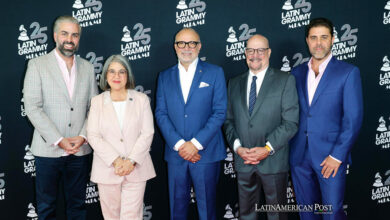Glyphosate: an atrocity for Latin America
Listen this article
The use of glyphosate again causes controversy and terror in several Latin American countries

Glyphosate is a chemical product designed by the American multinational producer of agrochemicals Monsanto. This herbicide was developed to eliminate herbs, shrubs and, especially, plants of the parental type.
Leer en español: Glifosato: una atrocidad para Latinoamérica
According to the information provided by the multinational Monsanto, glyphosate was developed to control an abundant variety of weeds, which cuts and prevents the growth of a plant. In addition, the company clarifies that glyphosate is not present in humans, or in animals and, according to the information published on its website, "contributes to the low risk to human health, as long as it is used according to the instructions on the label".
However, these claims have not been enough, because last year the American company was forced to compensate Dewayne Johnson, a 46-year-old gardener after confirming that the terminal cancer he suffers was caused by glyphosate.
In addition, according to the California Environmental Protection Agency, today this multinational has another five thousand lawsuits filed by people with cancer attributed to the use of this chemical.
However, this does not seem to matter to several Latin American governments, as countries such as Argentina, Brazil, Uruguay, Paraguay, Peru, and Colombia continue to use this chemical to fumigate several illicit crops.
"All Latin American governments support Monsanto."
These are the affirmations of Dr. Merardo Ávila Vásquez, coordinator of the Argentine network Médicos de Pueblos Fumigados. According to Dr. Avila, there has always been a common position in Latin America governments on this issue.
It is not a secret that glyphosate is used massively, since, according to studies of the Red Argentina de Médicos de Pueblos Fumigados, Argentina has become the nation that uses the most pesticides in the world: its consumption is 5 kilos per inhabitant each year. In Brazil, the difference is not much, because the consumption of glyphosate is estimated by an amount of 3.5 kilos per inhabitant annually.
In countries such as Uruguay and Paraguay, there has been an increase in transgenic crops that resist glyphosate. In Colombia, despite the aerial asphyxiation of glyphosate was abolished by the ruling T-236 of 2017, due to the enormous disasters generated, the current president Ivan Duque asked to resume the use of glyphosate, while the former president Juan Manuel Santos said that it would be a mistake to return to these practices.
In addition, in the US budget for the year 2020, President Donald Trump made the request to the Congress to double the resources allocated to Colombia in order to advance in the fight against drug trafficking, which would make huge use of this chemical.
In fact, several public administrators have expressed their consent with the idea of endorsing again the aerial fumigations with this chemical, suspended in 2015. This was stated by the former member of the conservative party, Fernando Londoño: "Lots of glyphosate, let glyphosate rain in the fields of Colombia. It works wonders, the criminals fear it and the stories of the crops prove it. It is the United States that has paid the cost of the fumigations. They have given it to us for free, dear friends," he announced.
However, the truth is that it is unknown how free the contribution of the United States to Colombia will go. For example, although the use of the coca plant has been customary since the beginning of history in the native peoples of the Andes and the Amazon for medical and therapeutic use —only it when begins to procreate and extract the coke paste base is that it begins to be called an illicit crop—, the State has also used the use of glyphosate to harm licit crops in the regions where coca leaves are grown. This has greatly affected the health of its inhabitants, as it has forced them to leave their territory and thus manage to use these planting areas as African palm crops. This was stated by Pedro José Arenas, coordinator of the Observer for Illicit Crops of the department of Guaviare.
Maybe you are interested in reading: Iván Duque and the controversial decisions of the JEP
Glyphosate: Monsanto and its flagship product have generated serious impacts in Latin America
The Union of Scientists Committed to the Society and Nature of Latin America (USSCNAL) made a call to the Latin American authorities to definitively ban glyphosate, due to the obvious fatal effects on humans and the environment. "There has been evidence of an increase in the serious harmful effects that this herbicide has generated on human health and on key species for ecological balance," the Union said.
Moreover, the indigenous communities of Colombia, interviewed by the Ombudsman, claim to suffer digestive and respiratory diseases as a result of fumigations with glyphosate. As for plantings, huge losses have been reflected in corn, onion, plantain, cassava, and other crops.
In addition, Fabián Tomasi's death, who developed a toxic neuropathy due to the constant contact with glyphosate due to his work with fumigation planes in Argentina, has become a Latin American symbol of the fight against Monsanto and glyphosate.
Organic farming is the practice to be reborn from the ashes
Although the chemical industry and its marketing campaigns have tried to persuade the world that today it is impossible to maintain agriculture without the aid of synthetic fertilizers and pesticides, the environmental NGO Greenpeace, in relation to its work to achieve the prohibition of glyphosate, affirms that organic farming shows that not only is it the best option to preserve the environment and the health of all living beings, but also it is capable of feeding the planet if the necessary investments are made. This could be a green employment principle. This is shown in the information published on its website: "In the ecological agriculture model, the ecological balance based on biodiversity is promoted, being the only way to guarantee healthy food for today and also for the future".
LatinAmerican Post | Julieta Gutierrez
Translated from "Glifosato: una atrocidad para Latinoamérica"





